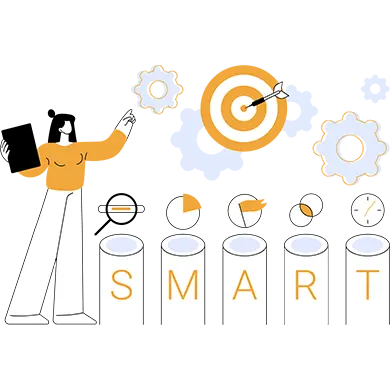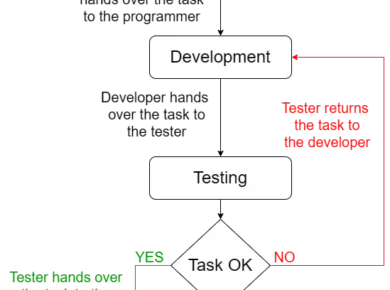Every project starts with good intentions — clear plans, motivated teams, confident timelines.
And yet, somewhere between kickoff and delivery, things begin to slip. Scope creep sneaks in. Deadlines stretch. Budgets start to bleed. Profit margins quietly erode while everyone scrambles to meet client expectations.
The reason? Most project goals aren’t goals at all — they’re vague aspirations. “Deliver quality work” or “keep the client happy” might sound right, but they don’t tell your team what success looks like or how to measure it. Without clarity, even experienced teams drift, wasting hours on rework and misalignment.
That’s where SMART goals come in. By defining Specific, Measurable, Achievable, Relevant, and Time-bound objectives, project managers turn ambition into action. SMART goals give you actionable targets, not vague aspirations — helping you protect profitability, keep teams accountable, and deliver projects that meet both budget and client expectations.
In this guide, you’ll learn exactly how to set SMART goals for project managers, plus five real-world examples you can use to strengthen your next project plan.
What Are SMART Goals in Project Management? (A Quick Refresher)
SMART goals are one of the simplest and most reliable frameworks for turning broad intentions into clear, actionable targets, and can be applied across various project management techniques. The acronym stands for Specific, Measurable, Achievable, Relevant, and Time-bound — but in project management, each element has a very particular meaning tied to scope, resources, and profitability.
S
Specific
Define the deliverable. What exactly must be completed, and who is responsible for it? Instead of saying “Improve project reporting,” specify “Create a weekly project dashboard with task status, hours tracked, and budget spent.” Specificity keeps teams aligned and prevents scope creep.
M
Measurable
If you can’t track it, you can’t manage it. Decide how progress and success will be measured — through clear Key Performance Indicators (KPIs) or milestones. For example, “Reduce project turnaround time by 15%,” or “Maintain client satisfaction above 90%.” Measurement transforms effort into data you can act on.
A
Achievable
Ambition is good, but goals must fit your team’s actual capacity and available resources. Ask, “Do we have the people, tools, and time to reach this target within the budget?” Achievable goals balance challenge with realism, helping teams perform without burning out.
R
Relevant
Every project goal should align with both the client’s strategic objectives and your company’s business goals. If a task doesn’t move the needle toward profitability, reputation, or client value, it’s a distraction. Relevance keeps your focus where it matters most.
T
Time-bound
A goal without a deadline is just a wish. Define the project timeline clearly — including key milestones and final delivery dates. For example, “Complete User Acceptance Testing by March 15 with no more than five critical bugs remaining.” Deadlines drive accountability and momentum.
5 Actionable SMART Goals Examples for Project Managers
These five examples reflect the daily challenges of service-based teams — protecting profit, keeping clients happy, and delivering work on time and within scope. Each goal follows the full SMART framework, so you can adapt it directly to your own projects.
1. The Project Profitability Goal
Goal: Maintain a 35% profit margin across all active projects by the end of the quarter.
You’re delivering great work, but your projects aren’t translating into healthy profit.
Specific: Focus on maintaining a minimum 35% profit margin per project.
Measurable: Track billable vs. non-billable hours weekly to see where profit leaks occur.
Achievable: Use existing time-tracking and budgeting data to adjust workloads realistically.
Relevant: Profitability protects both your business and your team’s sustainability.
Time-bound: Reach the 35% margin by the end of the quarter, with monthly check-ins.
2. The Client Satisfaction Goal
Goal: Achieve a 90% or higher client satisfaction score (CSAT) across all completed projects this year.
Your clients like your work, but frequent revision requests signal hidden dissatisfaction.
Specific: Improve client satisfaction scores measured through post-project surveys.
Measurable: Track CSAT ratings and count the number of revision requests per project.
Achievable: Standardize client feedback forms and conduct short review calls after delivery.
Relevant: Higher satisfaction builds trust, leads to repeat business, and improves referrals.
Time-bound: Maintain or exceed a 90% CSAT average by year-end.
3. The Team Efficiency Goal
Goal: Reduce unbillable administrative time by 20% and improve team utilization rate by the next quarter.
Your team spends too much time on coordination rather than delivering results.
Specific: Target a 20% reduction in unbillable admin hours.
Measurable: Monitor utilization rates and administrative time using your time-tracking tool.
Achievable: Streamline workflows with standardized templates and automated reports.
Relevant: Increased efficiency directly boosts project profitability and morale.
Time-bound: Reach this reduction within one quarter, reviewed at monthly sprint retrospectives.
4. The Deadline & Milestone Goal
Goal: Complete User Acceptance Testing (UAT) for the new platform with fewer than five critical bugs by March 15.
You’ve seen projects stall in their final testing phase, delaying delivery.
Specific: Complete the UAT phase for the current project.
Measurable: Fewer than five critical bugs remaining before launch.
Achievable: Assign a dedicated QA lead and allocate testing hours in the project plan.
Relevant: Meeting deadlines and milestones protects credibility and keeps revenue predictable.
Time-bound: Finish UAT by March 15 and sign off all phase-one milestones on schedule.
5. The Budget Control Goal
Goal: Keep project expenses within 5% of the allocated budget on all active projects.
You’re seeing budgets slowly expand during execution, cutting into margins.
Specific: Limit budget variance to no more than 5% from the original plan.
Measurable: Use real-time budget tracking in your project dashboard.
Achievable: Review expenses weekly and flag deviations immediately for discussion.
Relevant: Tight budget control prevents overruns and ensures predictable profitability.
Time-bound: Apply this limit consistently for the duration of the current fiscal year.
Each of these SMART goals demonstrates how clarity leads to control — and how control safeguards both profit and peace of mind. But knowing what a SMART goal looks like is only half the battle. The real advantage comes from building your own system for setting and tracking them consistently.
Here’s a simple, repeatable framework to help you write SMART goals that connect strategy, execution, and profitability.
How to Write Your Own Project Management SMART Goals (A 4-Step Framework)
Setting SMART goals doesn’t have to be complicated. The key is to connect each goal directly to your company’s objectives and make sure your team can measure and act on it daily. Follow these four steps to create a process that scales with your projects.
1
Step 1: Start with the High-Level Business Objective
Every project goal should ladder up to a bigger purpose. Before you write a single sentence, connect your project goals to the company’s strategy or your client’s long-term objectives.
Ask yourself: What business outcome should this project influence? Is it profit growth, client retention, or operational efficiency? Aligning goals with strategy ensures stakeholder alignment from the start — and prevents chasing metrics that don’t truly matter.
How it fits the SMART framework:
This step defines the Relevance of your goal. When every target supports the broader business objective, you avoid busywork and focus only on actions that move the needle.
2
Step 2: Involve Your Team in the Goal-Setting Process
Project goals fail when they’re imposed from the top down. Instead, involve your team early so they can help define targets that are both ambitious and realistic.
When people participate in creating goals, they buy in. They understand the “why,” set achievable targets, and feel genuine ownership over results. In practice, this means hosting short kickoff sessions, reviewing feasibility together, and confirming resource availability before locking in deliverables.
How it fits the SMART framework:
This step reinforces the Achievable and Specific aspects of SMART goals. A team that helps define the goal brings clarity to what’s possible and who’s responsible, reducing risk and overcommitment.
3
Step 3: Use a Central Tool to Track Progress
Even the best SMART goals fall apart if they live in scattered documents or disconnected spreadsheets. Spreadsheets are prone to error and don’t provide real-time visibility into what’s actually happening day to day.
That’s why project managers need a single source of truth — a goal-tracking tool that connects time, budget, and progress in one place. Platforms like PlanArty make this simple: you can track billable hours, monitor project budgets, and visualize progress toward each milestone. With that visibility, staying profitable stops being guesswork.
How it fits the SMART framework:
This step enables the Measurable part of SMART. A tool like PlanArty gives you tangible metrics, dashboards, and KPIs — turning abstract targets into quantifiable progress.
4
Step 4: Schedule Regular Goal Reviews
SMART goals aren’t static. Projects evolve, priorities shift, and assumptions break. Schedule structured review points — at project milestones, monthly check-ins, or sprint retrospectives — to measure progress and adjust as needed.
Regular reviews keep teams on track, prevent unpleasant surprises, and allow for quick course corrections before problems become expensive. Over time, this rhythm of reflection turns goal-setting into a core part of your project culture.
How it fits the SMART framework:
This step secures the Time-bound and Measurable elements. Clear review intervals create a rhythm of accountability and momentum, ensuring that timelines remain visible and achievable.
Together, these four steps create a closed-loop system:
- Relevant: Start with strategy.
- Specific & Achievable: Involve your team.
- Measurable: Track with precision.
- Time-bound: Review regularly.
When these layers work together, your goals stop being theoretical — they become operational tools that guide every project toward profit and clarity.
From Vague to SMART: Turning a Generic Goal into a Measurable Success
Let’s see how these four steps work in practice. We’ll start with a vague project management goal and shape it into a clear, measurable, and actionable one.
The Starting Point (Vague Goal)
“We need to improve how our projects perform.”
This is a familiar statement — and one that also leads to confusion. It’s too broad, lacks accountability, and doesn’t indicate how improvement will be measured.
Step 1: Start with the High-Level Business Objective
When you align this goal with a broader business objective, it starts to gain focus.
For example, if your company’s objective is to increase profit margins, you can restate the goal as:
“We need to improve project performance to increase our profitability.”
Now it’s relevant — it connects the project team’s efforts to a strategic business outcome.
Step 2: Involve Your Team in the Goal-Setting Process
Bring the team into the discussion. They point out that time tracking is inconsistent and budget control is often compromised during execution. Together, you define what “improving project performance” actually means. This collaborative approach is especially important when introducing time management solutions to ensure your team understands the ‘why’ behind the process.
“We’ll improve project performance by tracking time accurately and keeping projects within their planned budgets.”
This step makes the goal specific (what to do) and achievable (based on team capacity and real constraints).
Step 3: Use a Central Tool to Track Progress
Now, translate this into something measurable. With a central tracking tool like PlanArty, you can monitor both billable hours and expenses in real time.
“We’ll use PlanArty to track billable vs. non-billable hours and monitor project resources weekly to keep budgets under control.”
The goal is now measurable, supported by data, and managed in one place.
Step 4: Schedule Regular Goal Reviews
Finally, set a clear time frame and regular checkpoints.
“By the end of this quarter, we’ll improve project profitability by ensuring every project stays within 5% of its planned budget and maintains at least a 35% profit margin, reviewed monthly in PlanArty.”
Now, the goal is Specific, Measurable, Achievable, Relevant, and Time-bound — a complete SMART goal ready for execution.
The Final SMART Goal
✅ “By the end of this quarter, we’ll improve project profitability by ensuring every project stays within 5% of its planned budget and maintains at least a 35% profit margin, reviewed monthly in PlanArty.”
From a vague intention to a precise commitment — this is the power of SMART thinking in project management.
Conclusion
SMART goals are far more than a planning exercise — they’re the bedrock of project profitability. They provide project managers with a structured approach to turn vision into measurable outcomes, replacing guesswork with data and accountability.
When applied consistently, SMART goals become the language of clarity, aligning teams, reinforcing client trust and transparency, and making it possible to stop profit leaks before they occur. They transform what used to be an academic exercise into an essential tool for running predictable, profitable projects.
But remember — setting SMART goals is only the beginning. The true power lies in tracking them.
Setting SMART goals is the first step. Tracking them is the key to success.
See how PlanArty gives you real-time visibility on every project goal — from billable hours to budget adherence — so you can stay in full control of your projects and deliver both results and profit with confidence.
Frequently Asked Questions
What are SMART Goals?
SMART is a goal-setting framework used to transform vague intentions into clear, actionable targets. The acronym ensures that every objective you set is well-defined, trackable, and strategically sound.
Each letter represents a key criterion:
– Specific: Clearly defined, leaving no room for misinterpretation.
– Measurable: Trackable with concrete data or Key Performance Indicators (KPIs).
– Achievable: Realistic given your team’s capacity, budget, and timeline.
– Relevant: Aligned with broader business or project objectives.
– Time-bound: Anchored to a specific deadline or timeline.
In essence, the SMART framework provides a checklist to ensure your goals are not just ideas, but concrete commitments that drive predictable results in a project.
What makes a project goal “SMART”?
A goal becomes “SMART” when it meets five specific criteria: It must be Specific (clearly defined), Measurable (trackable with KPIs), Achievable (realistic), Relevant (aligned with business objectives), and Time-bound (has a clear deadline). This framework transforms a vague objective into an actionable target.
What is the most common mistake when setting project goals?
The most common mistake is a lack of measurability. Goals like “improve client communication” or “increase efficiency” are good intentions but are impossible to track objectively. Without a clear KPI (like “reduce client response time to under 24 hours” or “decrease non-billable hours by 10%”), you have no way of knowing if you’ve actually succeeded.
How often should you review project SMART goals?
Goals should be reviewed at a regular, predictable cadence. A good practice is to check in on progress during weekly or bi-weekly team meetings and conduct a more formal review at key project milestones. This allows your team to make course corrections before small deviations become major problems.
What’s the best tool for tracking SMART goals?
While spreadsheets can work for very simple projects, they quickly become error-prone and fail to provide real-time visibility. The best tool is a centralized project management or profitability platform like PlanArty, which connects your goals directly to the time tracked, budgets, and milestones being worked on by your team.
Ready to See Your Business More Clearly?
Start your free, no-risk trial today. Get set up in minutes and see exactly where your time is going.
No credit card required • Cancel anytime





